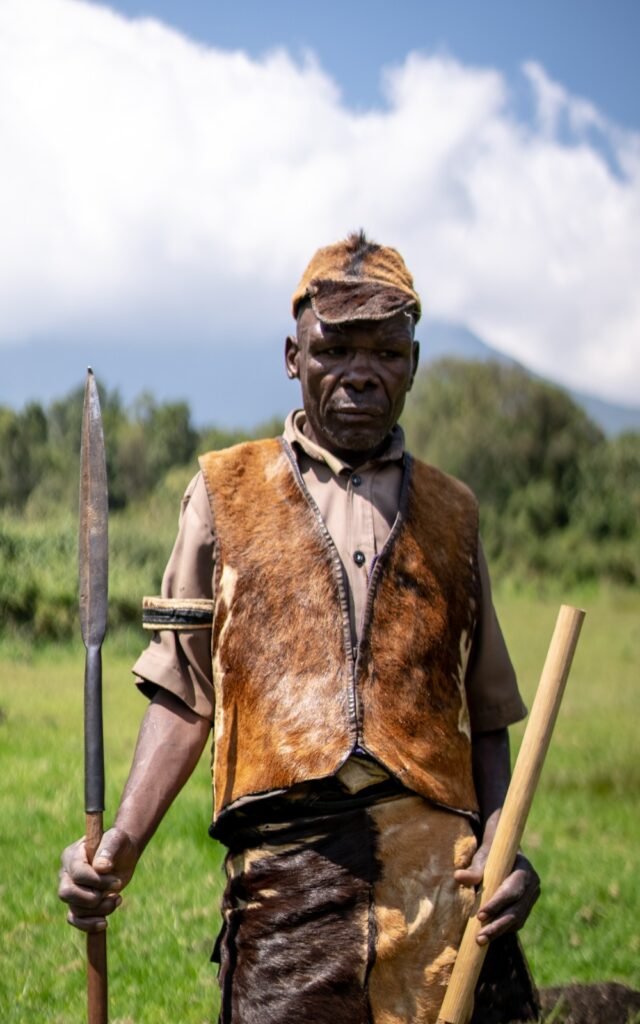Nestled in the mist shrouded highlands of southwestern Uganda lies one of Africa’s most extraordinary yet frequently overlooked communities ‘the Batwa people, revered as the “Keepers of the Forest.” As Uganda’s original inhabitants, the Batwa thrived for centuries in symbiotic harmony with the pristine ecosystems of Bwindi Impenetrable Forest and Mgahinga Gorilla National Park, mastering the art of sustainable living long before modern conservation efforts began.
Today, as Uganda emerges as a premier global tourism destination, the Batwa offer travelers a rare and profound opportunity to connect with one of Africa’s most ancient cultures. Their story is not just one of survival but of resilience, wisdom, and an unbreakable bond with nature.
Yet their legacy also serves as a powerful reminder: true conservation cannot exist without cultural preservation. The Batwa’s intimate knowledge of the forest, passed down through generations, holds invaluable lessons for a world grappling with ecological crises. By engaging with their community, visitors don’t just witness history, they become part of a movement to honor, protect, and learn from one of humanity’s oldest sustainable traditions.
This is more than cultural tourism it’s a chance to walk with the guardians of the forest and carry their story forward.

Mutwa Hunter with Spear
The Batwa people are among Africa’s last traditional hunter-gatherers, possessing an extraordinary, generations-deep knowledge of the forest ecosystem. For centuries before these lands became protected national parks, the Batwa flourished in sustainable coexistence with their environment. Their survival depended on expert tracking of wild game, sustainable harvesting of medicinal plants, skillful honey gathering, and constructing temporary shelters using only forest materials.
To the Batwa, the forest represented far more than physical sustenance, it was a living, spiritual entity. Every element of their woodland home carried profound significance: ancient trees served as sacred sites, animals as spiritual messengers, and streams as life-giving forces. This holistic worldview was instilled from childhood, with each new generation learning to move through the forest with reverence, taking only what was needed while protecting the delicate balance of nature.
The forest functioned simultaneously as pantry, pharmacy, cathedral, and classroom – a complete life-support system that sustained both body and soul. This profound connection shaped a unique conservation ethic centuries before modern environmentalism, making the Batwa true pioneers of sustainable living. Their traditional practices offer invaluable insights for contemporary conservation efforts seeking to harmonize human needs with ecological preservation.
In the early 1990s, the Batwa were evicted from their ancestral lands to make way for gorilla conservation and the establishment of national parks. While this move helped protect endangered mountain gorillas, it came at a steep cost: the Batwa were left landless, homeless, and marginalized, without compensation or legal recognition.
Since then, many Batwa families have struggled to adapt to life outside the forest. They now live in makeshift settlements on the edges of the parks, often without access to land, education, or healthcare. Their once self-sufficient lifestyle has been replaced by poverty and dependency.
Yet the Batwa have not given up their identity. Across the region, Batwa elders and youth are working hard to preserve their cultural heritage, from traditional dances and music to forest survival skills and oral storytelling.
Visitors can now participate in community-led cultural experiences, such as the Batwa Trail in Mgahinga Gorilla National Park. Guided by Batwa elders, this trail allows tourists to walk through the forest as the Batwa once did, learning to light fires without matches, identify medicinal plants, hunt with bows and arrows, and listen to legends around sacred caves.
Through these immersive experiences, tourists not only gain insight into a disappearing way of life but also contribute directly to the community’s well-being. The income generated from cultural tourism helps fund education, healthcare, and land advocacy for Batwa families.
A visit to the Batwa is more than a tour it’s a powerful lesson in living sustainably with nature.
Looking for a travel experience that goes beyond the ordinary? Join KAJU NATURE AND COMMUNITY TOURS UGANDA Ltd. and walk hand in hand with history. We offer authentic, ethical, and immersive Batwa cultural encounters led by Indigenous guides who share their stories, wisdom, and traditions with warmth and pride.
By choosing us, you’re not only exploring Uganda’s rich heritage, you’re also empowering local communities and supporting sustainable tourism. Whether you’re a cultural traveler, nature lover, or ethical explorer, this journey will touch your heart and leave a lasting impact. By choosing us, you,
-Support sustainable tourism,
-Empower Batwa communities,
-Gain a life-changing cultural perspective,
Book your Batwa experience today!
Email: contact@kajutours.com
Website: kajutours.com
Location: Buloba, HB Complex, Mityana Road.
KAJU – Travel with Meaning. Connect with Culture. Empower Communities.